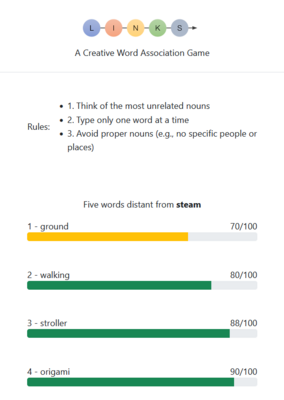LINKS
In the LINKS project, creativity is assessed through a game where the user has to come up with unrelated words. The game then measures the semantic distance between the words, which reflects how related or connected two words are. Less obviously connected words would indicate greater creative thinking, a concept known as divergent thinking. This involves generating unique ideas and exploring multiple solutions to a problem. Research has shown that being able to think of words with a greater semantic distance between them indicates higher creativity. Thus, LINKS uses these word associations to measure creative potential and cognitive flexibility, making it a novel method to assess how flexibly and creatively someone can think.
The goals of LINKS are to deepen our understanding of creativity and its practical applications. These goals include educating players on semantic distances and their relation to creative thinking, enhancing creative thinking skills through gameplay, investigating the transfer of knowledge from the game to real-life applications, and promoting cognitive flexibility by making connections between unrelated ideas.
Ongoing studies are currently measuring user experience and performance to continuously improve the game, maximizing its educational and cognitive benefits. By combining language technology with gamification elements, the LINKS project aims to boost and possibly teach creative thinking in an accessible and enjoyable way.
- Try out LINKS here.
- For more information or to get involved with our project, please reach out to us.
Further information
Bianka Szöllösi

Data Scientist
Related projects
Team
Janet Frances Rafner

AIAS-SHAPE Fellow
Bianka Szöllösi

Data Scientist
